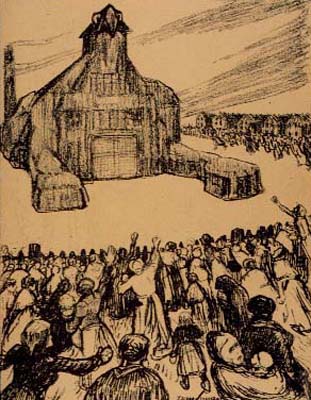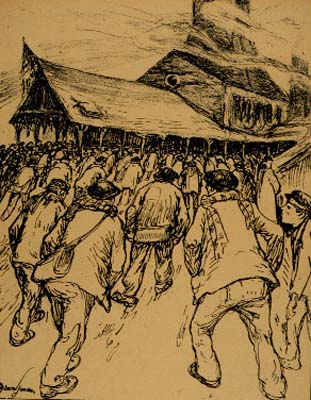image banks
--l'assiette au beurre
--Les Quatre Saisons de la Kultur
 |
 |
Le Voreux
The engine-man, with his hand on the lever, listened to the ringing of the signals, and looked fixedly at the indicator which showed the shaft with its different stories in a vertical groove, where bullets representing the cages dangled from strings. At each fresh start, the drums, two enormous wheels five yards in ciroumference, around whose boxes the steel cables coiled and uncoiled themselves, whirled so rapidly that they looked like so much gray dust.
Look out there ! shouted three banksmen, who were dragging a gigantic ladder.
Etienne was nearly knocked down. His eyes were becoming accustomed to the sight before him, and he stared at the cables, ninety feet of steel ribbon, leaping straight into the tower of the shaft, whence, after passing over somepulleys, they dropped vertically into the pit, where they were attached to the elevator cages. An iron framework, suggesting that of abelfry, supported the pulleys. And the whole gave Étienne the impression of a bird winging its flight. Noiselessly, without impediment, ever and ever did the cable come and go, capable of lifting twelve tons weight at a time, at the rate of thirty feet a second.
Look out there!' again shouted the banksmen, who were shifting the ladder to the other side to examine the left hand pulley.
Étienne slowly retraced his stops to the receiving shed. The terrific whirl above his head had somewhat bewildered him. Shivering in the draughty air, deafened by the rumbling of the trucks, he stood watching the working of the cages. Close to the shaft, the signal, a heavy hammer moved by a lever, pulled from below by a rope, and falling upon a metal block, kept striking—one stroke to stop, two to let down, three to haul up. The blows rose incessantly above the tumult, accompanied by a perpetual sounding of alarms. The brakesman directing the manoeuvres increased the noise by shouting his directions to the engine-man through a speaking-trumpet. Amidst all this commotion the ecages came and went, filled and emptied, without Étienne understanding anything of the complicated business.
One thing he comprehended well enough—that the shaft swallowed up men by mouthfuls of twenty and thirty at one gulp, and with such apparent ease as to be unconscious of it. At four o'clock the descent of the colliers had begun. They arrived from the shed, barefooted, lamp in hand, and waited in small groups until a sufficient number had collected. Without a sound, gliding softly from the dark depths below, the cage, with its four stories, each containing two trucks full of coal, swung silently on to the platform in front. At each landing the banksmen took out the full trucks and replaced them with empty ones, or with others already filled with wood for propping purposes. The colliers wedged themselves into the empty trucks, five by five, as many as forty at a time when they occupied all the compartments. An order, a kind of indistinct roar, was shouted through the speaking trumpet, the signal-rope was pulled four times to give notice of the starting of- this cargo of human flesh; then after a slight jerk the cage plunged silently, like a stone thrown down a well, leaving no trace of its passage behind save the vibrating flight of the cable.
It's deep, isn't it ? Étienne asked of a collier, who, still half asleep, stood near him waiting for his turn.
Just a little over eighteen hundred feet, the man replied. But there are four junctions before that, the first at nearly a thousand feet from the top.
Both became silent, with their eyes fixed on the cable which was coming up.
And when it breaks ? resumed Étienne.
Ah! when it breaks... echoed the man: and he finished the sentence with an expressive gesture. His turn to descend had come; the cage was waiting. He squatted down in it with some comrades. It plunged again, and in another four minutes reappeared for a fresh load. And so things went on for more than half an hour, during which the shaft continued swallowing its human prey, in more or less gluttonous fashion according to the depth of the junction to which the cage descended. Ever famished, like some giant who was capable of digesting a whole nation, it swallowed and swallowed, while the gloom remained lifeless and the cage kept reappearing from the abyss amid the same voracious silence.
At last Étienne was taken with a sickening sensation...
In the Mines:
The four hewers had stretched themselves at full length, one above the other, across the front of their cutting. Separated one from another by boards which were driven into the seam by means of pointed wedges, and which caught the coal as it fell, they each occupied about five yards of the vein, which was so thin in this particular spot—barely more than eighteen inches—that they were almost flattened between the roof and the walls, and had to crawl along on knees and elbows, unable to turn without hurting their shoulders. They had to strike the seam lying upon one side, their necks twisted and their arms wielding their short-handled picks obliquely.